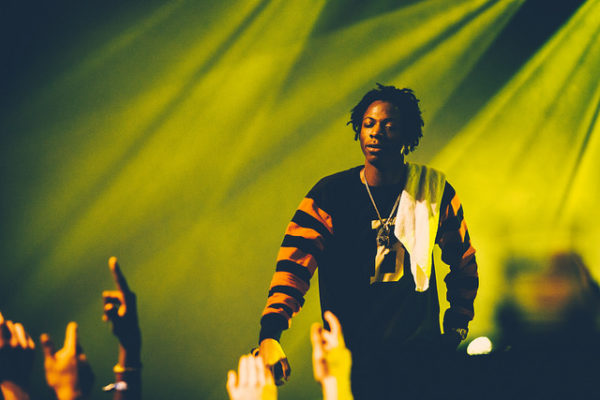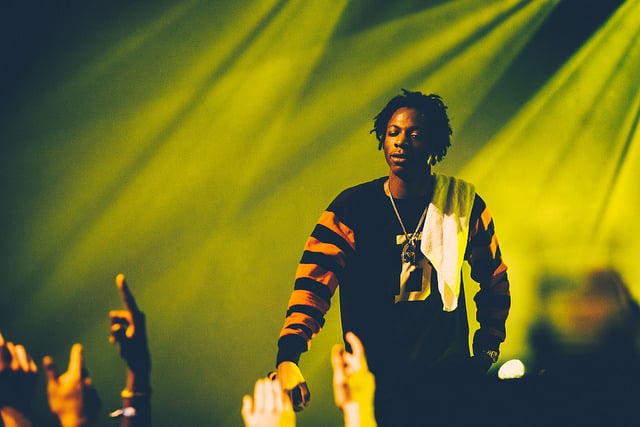
“All Amerikkkan Bada$$,” the second full-length commercial album by Brooklyn rapper Joey Bada$$ released on April 7, is a riveting and political saga that poignantly details the state of Black America. It’s a provocatively named record that doesn’t front — there’s no doubt that lyrically, Joey delivers, and that the album is branded by a musical texture that has a very different trajectory from previous works like the mixtapes “1999” and “Summer Knights” and his debut album “B4.DA.$$.”
“All Amerikkkan Bada$$” is about healing, terrorism, criticism, reclamation, liberatory poetics and Joey Bada$$’s own evolution as an artist. The texture is characterized by seamless transitions from the spacey, melodic and twangy intros off songs like “For My People” and “Y U DON’T LOVE ME?” and the rumbling, angry and vaguely dissonant rhythms off “Rockabye Baby.” They all speak to vibrant themes of resistance, the difficulty of blooming in a world not created for you. They express the wide spectrum of emotions that oppression provokes, whether it’s the black rage felt in “Babylon” that “Amerikkka” is responsible for inflicting, pathologizing and criminalizing — or the psychological relief that escapism provides.
The album kicks off with the soulful “Good Morning Amerikkka.” It channels Sun Ra’s 1974 Afrofuturist science fiction film “Space is the Place” in the outro sample: “I came from A dream/That the black man dreamed… long ago/I’m actually a present sent to you/By your ancestors” — a beautifully optimistic soundbite. The theme of police brutality that is thoroughly incorporated into the album pays homage to hip hop’s longstanding feud with law enforcement, and is reminiscent of KRS One’s “Sound of da Police” or NWA’s “Fuck tha Police.” Although Joey doesn’t sound quite the same, he’s clearly continuing the highly politicized legacy of old school hip hop. The first song does an excellent job at setting up the story that’s going to be told over the course of the album: a story of politics, freedom, inescapable cycles of poverty, racism and despite it all, happiness. Joey’s album is a discourse of black people’s past, (“the land of the free, it’s full of freeloaders/They disorganized my people, made us all loners/Still got the last name of our slave owners”) present and future relationships with America.
Themes of resistance are not at all new to Joey’s music. “All Amerikkkan Bada$$” represents a more developed articulation of Joey’s politics rather than a complete shift of focus. Songs like “Survival Tactics” from “1999” are critical of government and institutions, but not quite in the all-encompassing way that “All Amerikkkan Bada$$” is. Moreover, Joey’s style has come a long way from the old school throwback of “1999.” Joey’s built some serious longevity for himself as a musician, evolving from his iconic 90’s gritty hardcore hip hop identity to a more mature, cleanly produced and updated sound.
The sampling of the simple groovy loops from oldie producers (MF DOOM, J Dilla) is nowhere to be found on “All Amerikkkan Bada$$,” but the jazz and funk exuded by past works pervade each track. The reggae sounds found on“Super Predator” and “Babylon” (featuring prominent Jamaican reggae artist Chronixx) are a continuity from Joey’s past music, namely “Summer Knights”’ “My Youth” and “Belly of the Beast” (which also features Chronixx). While the old-school influences are still strongly present, Joey has created something else entirely with this newest album.
There’s no doubt that “All Amerikkkan Bada$$” has good intentions. In “For my People”, the album’s second track, Joey raps: “This for my people/trying to stay alive and just stay peaceful/so hard to survive a world so lethal/Who will take a stand and be our hero?” In doing so, Joey situates himself and his talent at the forefront of this historical moment. Joey sees his responsibility to be in debt to his people, and to act with the intention of forwarding the political movement for civil rights. He gripes about the way the state is permitted to arbitrarily end people’s lives, the way in which social progress is uprooted: “They don’t wanna see you fly, they just gonna shoot your wings.” His writing evokes moments in the history of Black oppression in America, like the state-sponsored destruction of Greenwood, Oklahoma, affectionately known as “Black Wall Street”, or the formation of COINTELPRO to discredit the growing political movement to achieve basic human rights for black people — or the shootings of young black boys who have yet to graduate from college, high school or middle school — to have their lives ripped from them and abruptly cut short, because of the disparaging standard of adulthood the state imposes on them.
“Temptation” tells a story of psychological violence. It opens up with the tearful, September 2016 testimony of a nine-year-old girl during a council meeting days after the police shooting of Keith Lamont Scott. It’s a story of the conflicting ethics of living lavishly while the people that look like you are being gunned down on the streets: “I never felt so selfish before/I been living so reckless, I know.” Joey then attributes this suffering to the state: “The government been tryna take away what’s ours/It’s really all about the money and the power/I just wanna see my people empowered.” The song ends on a lighter note, however, by continuing with the testimony of the girl: “We are black people and we shouldn’t have to feel like this/We shouldn’t have to protest because you are treating us wrong/We do this because we need to and we have rights”.
The next song, “Devastated” was released nearly a year in advance of the album drop. It juxtaposes themes of grief that are richly represented in the past couple of songs. “Devastated”, contrary to what its name conveys, is about resilience, patience, hard work and luck. It’s a “from-rags-to-riches” success story. But that doesn’t last long.
“Y U DON’T LOVE ME?” is a story about unrequited love, a devastating romantic relationship that serves as a metaphor for black people’s relationship to America. It’s about being unable to break the indestructible cycles of poverty, about the impossibility of attaining equality in America, about the lack of love that sends people of color into spiraling cycles of self-hatred.
“Babylon” is certainly a standout track on the album. It captures the raw intensity of Joey’s anger, it represents everything that’s beautiful about channeling your anger into creativity, creation and in turn, healing. It starts off innocently, a serene and simple melody intentionally included so as not to distract from Joey’s lyricism, clearly the centerpiece, foreground, and main instrument. His verses are emotionally volatile. They explore fear, vulnerability, rage. “Turn on to CNN/look what I see again/It’s another black man/died at the white hand of justice/To tell the truth, man, I’m fucking disgusted/I fear for the lives for my sisters, my brothers,” Joey croons into the microphone over a synth-y sounding piano and an elegant variety of brass instruments. After Chronixx’s chorus, Joey raps: “Cause most of them labels throw pennies so/Who you think investin’ in penitentiaries though?/Same owners as them labels, same owners of your cable
The truth is under your nasal but even the air’s all fucked up/How we supposed to see stars? Chemical trails above us… Nowaday they hangin’ us by a different tree/Branches of the government, I can name all three/Judicial, legislative, and executive.” Joey isn’t shy in his indictment — his criticism isn’t of mere “isolated incidents” that prove the system isn’t working. Instead he criticizes the structural racism that is endemic to the system that manifests itself in police brutality, environmental racism, cyclical poverty and psychological harm. These aren’t symptoms that prove the system isn’t working — they’re signs that the system is working exactly as planned.
Joey Bada$$’ first collaboration with J.Cole, who Joey has admired ever since he was 15, is the second to last song on the album. “Legendary” is lyrically dense, and explores subjectivity and one’s place in the world. Joey ruminates that poverty is a trap, and that he worries for his friends and the habits they take up that poverty corners them into, worries that the necessity of “survival” may entail working outside the system and its laws. J.Cole flows sentimentally about resilience, about life and whether he’s “doin’ it right” or hurting the ones he loves most, while an orchestra plays softly in the background, which grounds the emotional intensity of the song. The song is existential. It mourns the “quantity of cells” in prisons and the inevitability of this fate for the most vulnerable.
“Amerikkan Idol” is an appropriate ending to the album. It’s angry, but deliberate, it’s prideful, but rightfully outraged. It’s emotionally vibrant and quick-witted, it demands justice, it tries to spawn and galvanize action and interrogates white supremacy (“Who do we call when the police break the law?”) It alludes to the chemical warfare and pollution disproportionately waged on communities Ameri-KKK-a shuns. It calls out the bias of the media, and the respect that’s due to the people who built this country on their backs but were forced to assimilate their resistance and history.
More than anything, “All Amerikkkan Bada$$” is a tribute to the people who need it most.
Contact Esther Tsvayg at etsvayg ‘at stanford.edu.
